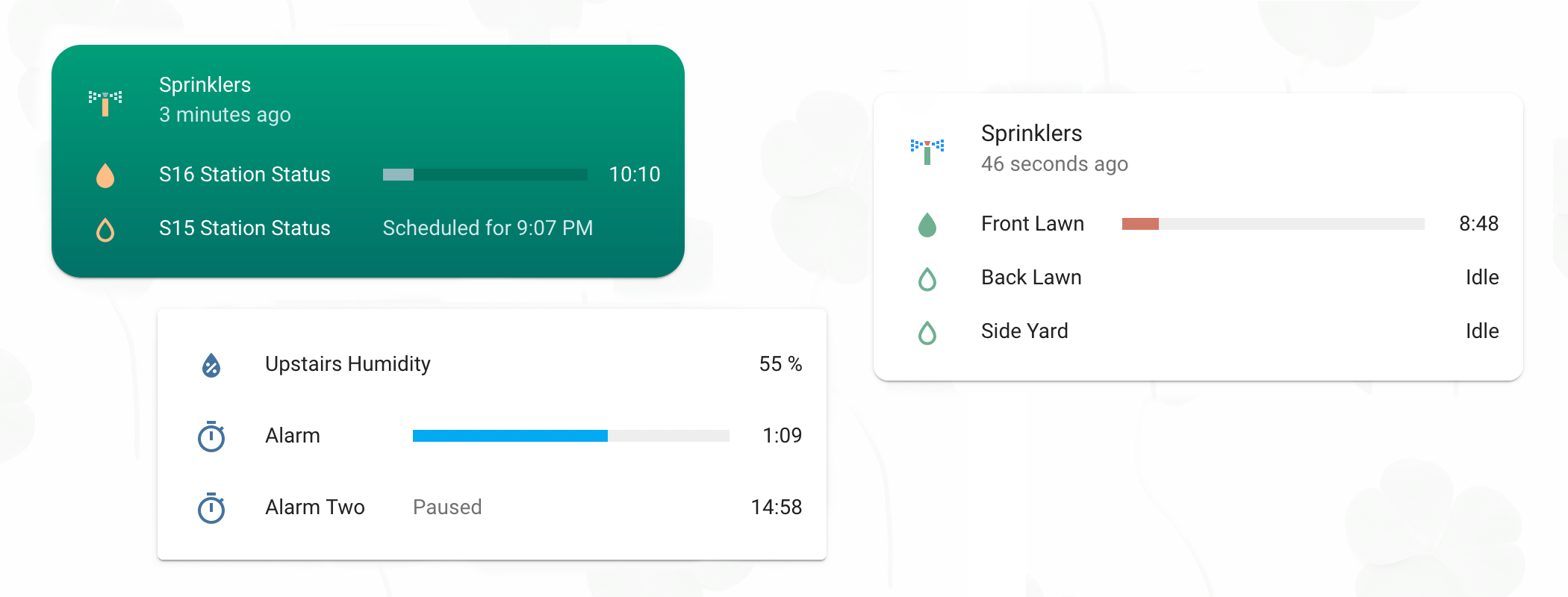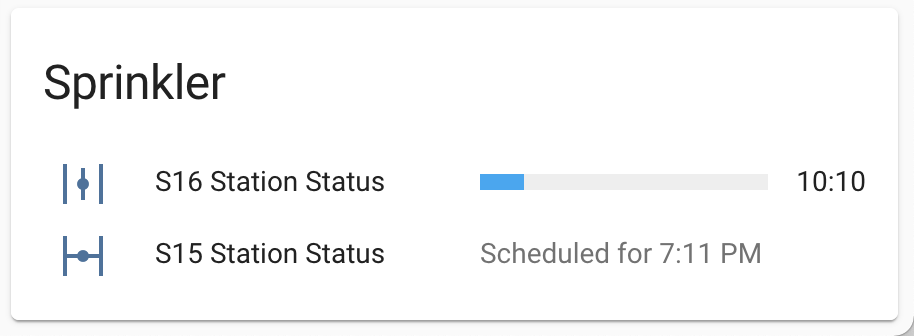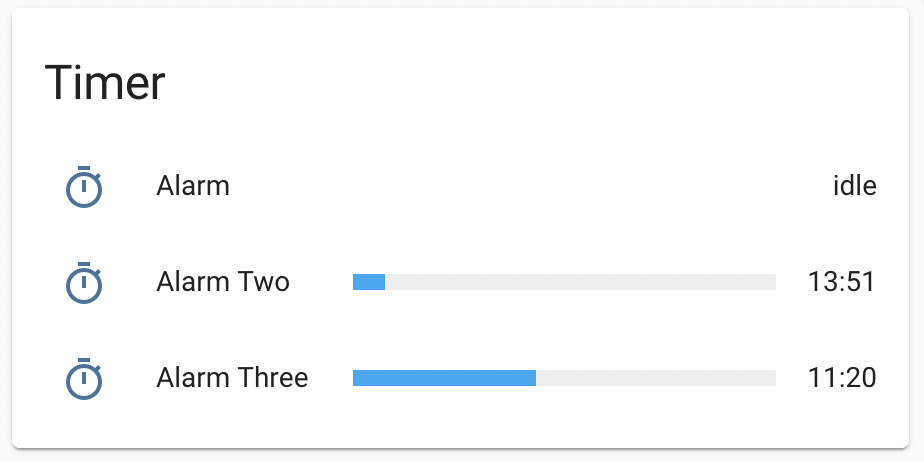README
Lovelace Timer Bar Card
A progress bar display for Home Assistant timers.
The card currently supports timer components and a few more integrations.

With a bit of work, you can also configure the card to suppport other types of entities—even plain switches that have automations.
For numerical quantities or percentages, you may be interested in the unaffiliated bar card.
Integration support status
🚧️ Did you configure the card for another integration? 🚧
I'd love to add it here! Please submit an issue/PR with the integration name and your configuration!
| Integration | Status | Extra configuration required |
|---|---|---|
| Home Assistant timer | supported & tested | no! 🎉 |
| Automation-controlled switches | supported & tested | set duration to { fixed: x:xx:xx } |
| OpenSprinkler | supported | no! 🎊 |
| Amazon Alexa Timer | supported | start_time, end_time, and guess_mode [#22] |
| Google Home Timer | supported | template entity required (thanks @jazzyisj!) |
| ThinQ washer/dryer | iffy [#15] | configure duration to initial_time |
| Google Home Alarm | not really [#18] | template entity required |
If your integration is not listed here, there's a high chance you'll need to look at your entity's attributes and configure the card to make the card work with the integration.
Install
Timer Bar Card is available from HACS. If you don't have HACS installed, follow the manual installation instructions.
Options
| Name | Type | Requirement | Description |
|---|---|---|---|
| type | string | Required | custom:timer-bar-card |
| entity | string | Optionalish | Display a single entity, for use in entities cards |
| entities | list | Optionalish | Display multiple entities in a card |
Either entity or entities must be supplied. Use entity if you'd like to embed the timer inside a card, or entities if you would like to create your own card (and use the card options at the end of this section).
Nonstandard Entity Config
Expand: Configure for entities that use a different set of status states
| Name | Type | Requirement | Description | Default |
|---|---|---|---|---|
| active_state | string or list | Optional | State(s) used to indicate a timer is running | active, on, manual, program, once-program |
| pause_state | string or list | Optional | State(s) used to indicate a timer is paused | paused |
| waiting_state | string or list | Optional | State(s) when a timer is scheduled for later † | waiting |
| guess_mode | bool | Optional | Attempt to guess mode=active. ‡ | false |
| start_time | dict | Optional | How the timer's start time is found | {attribute: start_time} |
| end_time | dict | Optional | How the timer's end time is found | {attribute: end_time} |
| duration | dict | Optional | How the timer's duration is found | {attribute: duration} |
| debug | bool | Optional | Show debugging info in card | false |
† requires a start_time attribute to calculate when in the future the timer will start.
‡ waiting_state and pause_state will still have an effect, but the card will disregard active_state if it can guess the timer mode.
Customization
Expand: Optional properties to change icons, colors, and sizes.
| Name | Type | Requirement | Description | Default |
|---|---|---|---|---|
| icon | string | Optional | Customize the icon to show next to the timer | - |
| image | string | Optional | Customize the image url to show in place of the icon | - |
| state_color | boolean | Optional | Change the icon's color if the timer is active | - |
| active_icon | boolean | Optional | Override icon when timer is active |
- |
| text_width | string | Optional | Space alotted for the time remaining (i.e. right offset of bar) | 3.5em |
| bar_width | boolean | Optional | Width of progress bar (decrease if the entity name is cut off) | calc(70% - 7em) |
| bar_height | string | Optional | Height of progress bar | 8px |
| bar_foreground | string | Optional | Foreground color of progress bar | primary color † |
| bar_background | string | Optional | Background color of progress bar | #eee |
| bar_direction | string | Optional | Override the direction of bar progress. Can be ltr or rtl |
- |
| full_row | boolean | Optional | Hide the name and icon, which widens the progress bar | false |
| modifications | array | Optional | Adjustments to make depending on percentage (example) | - |
| translations | dict | Optional | Mapping of substitutions for status text |
† the primary color is taken from your theme using var(--mdc-theme-primary, #6200ee);
You can also use actions with this card.
Card options
Expand: Customize the header and display of entities within the card. To use the card, entities must be defined.
| Name | Type | Requirement | Description | Default |
|---|---|---|---|---|
| name | string | Optional | Card name / title | - |
| compressed | boolean | Optional | Decrease vertical spacing between entities | false |
| filter | boolean | Optional | Only show non-idle timers and sort them by their status | false |
| header_entity | string | Optional | Replace title with the icon & name of an entity † | - |
| header_secondary | string | Optional | Show additional information under header_entity ‡ | - |
† If you specify header_entity, the name option will no longer have any effect.
‡ See the secondary_info parameter in the entities documentation for a list of possible values.
Examples
A Basic Example

type: custom:timer-bar-card
entities:
- timer.alarm
- timer.alarm_two
- timer.alarm_three
Receding progress bar
By default, the progress bar will extend from left to right. If you'd like the bar instead to shrink from right to left (as if it were counting down, rather than counting up), reverse the bar direction and invert the colors:
bar_direction: rtl
bar_foreground: '#eee'
bar_background: 'var(--mdc-theme-primary, #6200ee)'
Use with OpenSprinkler integration

entities:
- sensor.s14_station_status
- sensor.s15_station_status
- sensor.s16_station_status
type: custom:timer-bar-card
name: Sprinkler
active_state: # This option isn't needed due to the defaults
- manual
- program
bar_width: 35%
compressed: true
filter: true # So only the running and scheduled stations are shown
Use with unsupported entities
By default, the card will look for duration, remaining, start_time, or end_time attribute on your entity.
You can find a subset of these attributes in the entity popup, and a full list by going visiting the Developer Tools:

STEP ONE: Assign active_state, pause_state, and waiting_state if your entity's states are not included in the defaults (refererence the example above). If your active_state is not a constant, set guess_mode to true and the card will try to guess the mode.
STEP TWO: Turn on card debug mode by adding debug: true to the yaml configuration.
STEP THREE: Then follow these steps in order to figure out what you need:
1. My entity has an attribute that looks like duration (for example, timespan). Supply the following configuration:
duration: { attribute: "timespan" } # If your your duration attribute looks like 0:10:00.
debug: true
The entity's start time will be computed using the last_changed property (when the entity state last changed).
2. My duration isn't in the 0:10:00 format! I need to use different units!
Use the units property and specify seconds, hours, or minutes. The default value of units is duration, which expects colons in the duration.
duration:
attribute: "timespan" # Should look like 10 or 10.0
units: minutes
debug: true
3. The time last changed doesn't approximate the start time well enough, and my entity has a duration-looking attribute and a start time attribute (called start).
duration: { attribute: "timespan" }
start_time: { attribute: "start" }
debug: true
4. The entity has no duration attribute but it has start time and end time (finishes_at) attributes.
start_time: { attribute: "start" }
end_time: { attribute: "finishes_at" }
debug: true
Duration will be computed as the difference between these two times. You can also omit start time if you only have an end_time, in which case the last_changed property is used as the start time.
5. My entity has no attributes!
Imagine we have a switch, that, through an automation, will always turn off five minutes later after it's turned on. Timer bar card, can we do it? Yes we can! All it needs is a fixed duration and some love. Always love.

type: custom:timer-bar-card
entities:
- switch.my_switch
duration: { fixed: 0:05:00 } # 5 min
Like in step 1, there is no start_time configured so the card will use the time the switch was last toggled as the start time.
6. My duration actually comes from another entity
So far, duration has taken on type attribute and fixed. But there's a third type: entity! Assume there's a duration slider with id input_number.slider1.
type: custom:timer-bar-card
debug: true
entities:
- switch.my_switch # ID of the switch, which provides the active/idle status
duration:
entity: input_number.slider1
units: minutes # Since the slider state is a number like 10.0
7. My end time comes from the entity's state
End times and durations can use any of the types attribute, fixed, entity (you've seen these 3 before) and state! The state type uses the entity's current state. Let's say we have a timer who's state is the time it will go off, like 2021-09-07T20:24:13+00:00! Here's how to configure the card:
end_time: { state: true }
8. If your entity doesn't meet these criteria...
🧡 please create an issue and tell me the entity so I can improve these instructions! ❤️️
You may notice you cannot set
remaining. This is because for Home Assistant timers,remainingbehaves much likeduration, so to keep my own sanity I assumeremaining=duration. Since they are equal, you don't need both! Just useduration!
Embedded in an entities card

title: Timer
type: entities
entities:
- entity: timer.alarm
type: custom:timer-bar-card
- entity: timer.alarm_two
type: custom:timer-bar-card
- entity: timer.alarm_three
type: custom:timer-bar-card
Icons and entity in card header
entities:
- timer.water_timer
- timer.water_timer2
- timer.water_timer3
type: custom:timer-bar-card
icon: mdi:water-outline
active_icon: mdi:water
compressed: true
header_entity: binary_sensor.sprinklers
header_secondary: last-changed
Home Assistant configuration.yaml:
timer:
water_timer:
name: Front Lawn
duration: "00:15:00"
water_timer_2:
...
template:
- binary_sensor:
- name: "Sprinklers"
icon: mdi:sprinkler-variant
state: "{{ states.timer| selectattr('state', 'in', ['paused', 'active'] ) | list | count }}"
Go to the end for themes and multicolored icons
Style to your unique tastes

type: custom:timer-bar-card
entities:
- timer.alarm
- timer.alarm_two
bar_height: 20px
bar_background: '#222'
bar_foreground: 'linear-gradient(to right, red, orange, yellow, green, cyan, blue, violet)'
text_width: 6em
bar_width: 40%
Customize appearance based on timer percentage

type: custom:timer-bar-card
entities:
- timer.alarm
modifications:
- elapsed: 40%
bar_foreground: orange
active_icon: mdi:fire
bar_height: 12px
- elapsed: 70%
bar_foreground: red
active_icon: mdi:fire-alert
For each modification, you have the option of using remaining or elapsed to filter based on the time left or total time remaining in the timer. You can also use percentages (40% = 40% of duration) or durations (0:00:10 = 10 seconds). See my comment here for a more detailed example!
All modifications that match are applied, with the last modification having precedence. This means you'll likeley want to list them in increasing order of durations/percentages if using elapsed and decreasing order if using remaining, so that styles are overridden as the timer progresses farther.
Do note that
remaining: 1%is equivalent toelapsed: 99%, and that for a 10 second timerremaining: "00:00:01"is equivalent toelapsed: "00:00:09".
Show only progress bar

type: custom:timer-bar-card
entities:
- timer.alarm
full_row: true # hides the name and icon, but not time remaining
text_width: 0px # hide the time remaining
Even more options

Want to change the names of the entity statuses because they are in the wrong language or they just aren't cool enough for you? You can do that! Need to use different settings for each entity? You can do that too (replace the entity id with a YAML dict where the entity key is the ID, then you can add any other configuration option you like to change it for that entity).
type: custom:timer-bar-card
entities:
- timer.alarm
- entity: timer.alarm_two
icon: mdi:circle
translations:
idle: Gas, gas, gas!
Manual installation
- Download
timer-bar-card.jsfrom the latest release and move this file to theconfig/wwwfolder. - Ensure you have advanced mode enabled (accessible via your username in the bottom left corner)
- Go to Configuration -> Lovelace Dashboards -> Resources.
- Add
/local/timer-bar-card.jswith type JS module. - Refresh the page? Or restart Home Assistant? The card should eventually be there.
Using in your own custom cards
If you're publishing a custom card for Lovelace and would like to use the timer bar card inside of it, you can install the card via NPM as a dependency:
npm install --save lovelace-timer-bar-card
To avoid conflicts with the timer-bar-card-entity-row element this plugin defines, you'll need to give your custom element a different tag name.
import { fillConfig, TimerBarEntityRow } from 'lovelace-timer-bar-card/src/timer-bar-entity-row';
// Assign the tag <my-card-timer-bar-entity-row> to the entity row element
window.customElements.define('my-card-timer-bar-entity-row', TimerBarEntityRow);
// Use like this
const config = fillConfig({
// extra customization on top of default config
});
return html`<my-card-timer-bar-entity-row
.config=${config} .hass=${hass}
></my-card-timer-bar-entity-row>`;
For an example of using the timer bar card as a dependency, you can view the source code of the OpenSprinkler card.
Themes? Multicolored icons? Where?
The green and reddish-orange theme (which I called Earth) as well as the gradient theme can be found here. Neither are polished and both need work.
For multicolored icons, you can use this super-duper-hacky frontend module here until some form of support officially lands in Home Assistant. I would not rely on my module. Its purpose is merely to produce pretty screenshots so everyone is convinced I have the best dashboards.